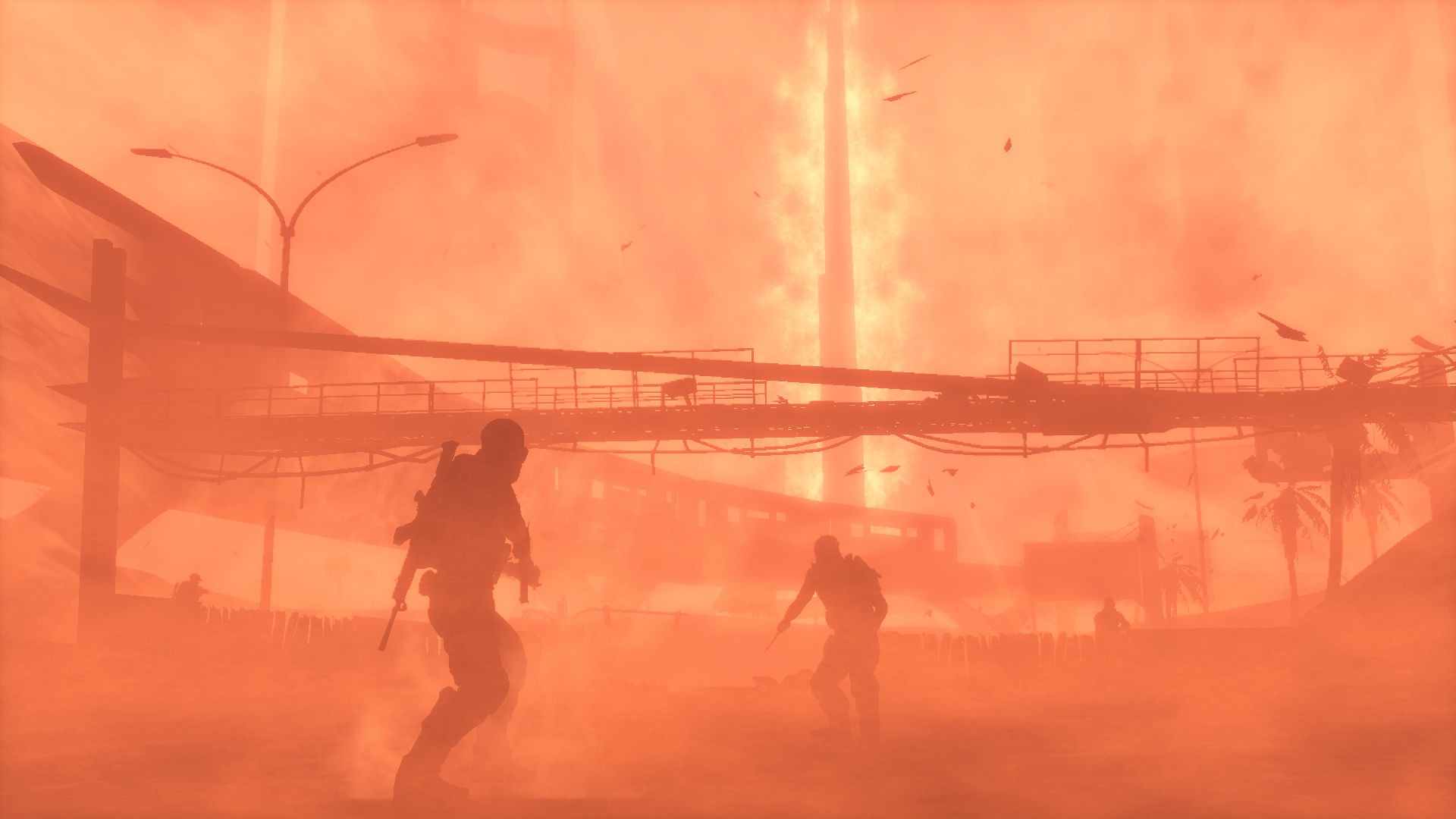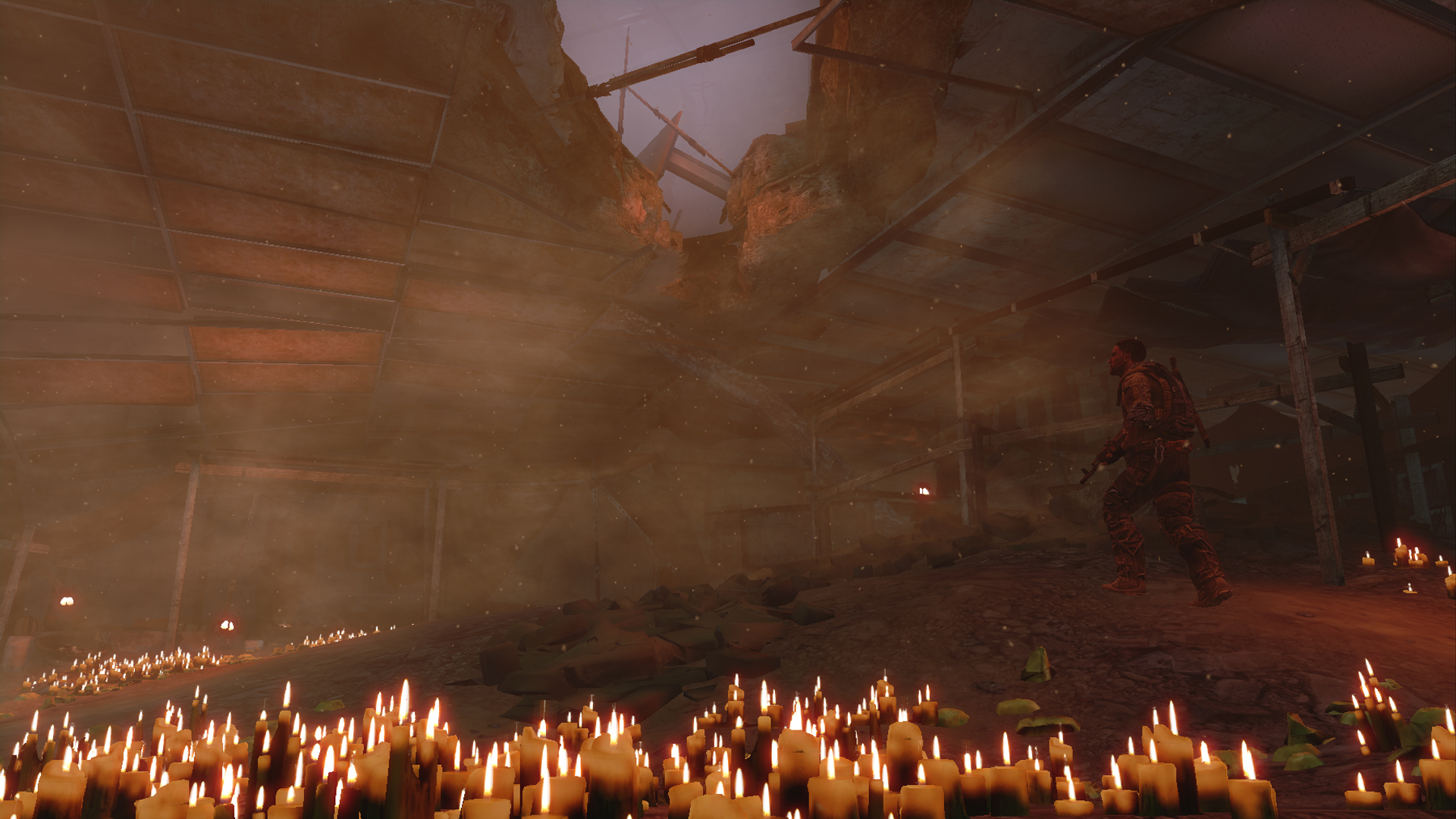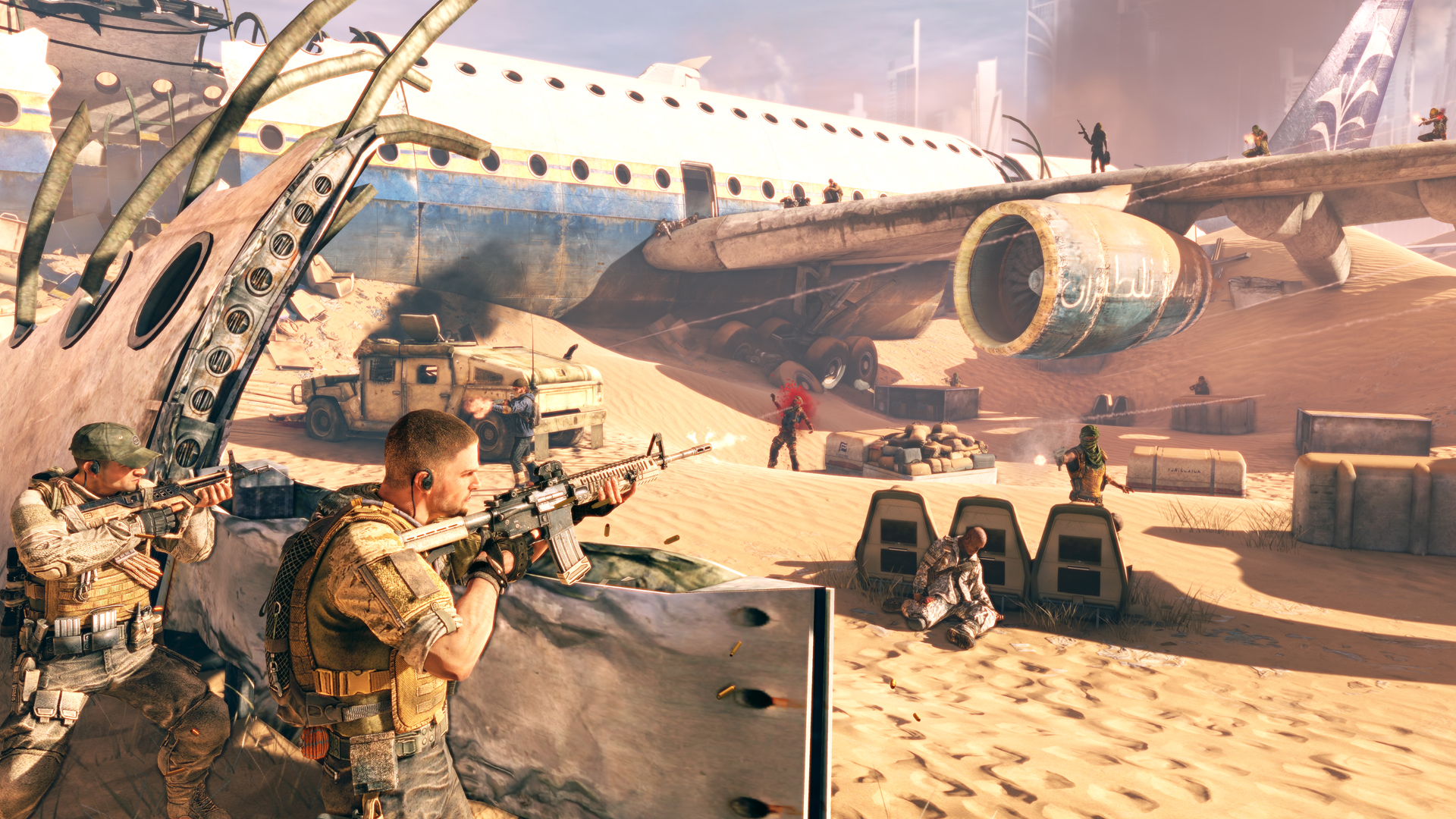Review: Spec Ops The Line
 Friday, July 27, 2012 at 12:05PM
Friday, July 27, 2012 at 12:05PM 
When it comes to the shooter genre, few mechanics have changed since the early days of Doom and the like. You have an objective to complete, there are a bunch of angry dudes in your way and you have to kill them all in order to advance in the game. Regardless of linearity, artificial intelligence or several dozen innovations increasingly improved over the past two decades, the approach to a game’s story hasn’t really lent itself to being truly exceptional. Every few years we get a Half-Life 2 or a Bioshock that really engages us but when such titles come along they really don’t seem like shooters. No, these titles lean more toward being an RPG as some incorporate that type of game’s gameplay elements. For me, it seems that the shooter really only receives a quality story once in a blue moon on a Friday the 13th of a leap year.
To that notion, 2K Games, the publisher who has been suffering from financial troubles as of late, decided to revive Spec Ops, a relatively mediocre shooter series whose last title came out a decade ago. Development of the game was handed to Yager, a German developer whose repertoire has been exclusively focused on sci-fi titles and hasn’t released a game in nine years. With any revival though there is potential for greatness for both the game and the developer. Does Spec Ops The Line achieve this or should the series have been left out to pasture?
Click to read the full article
Paved with the Best Intentions
In the world we live in today the city of Dubai, nestled against the Persian Gulf within the United Arab Emirates, is widely considered to be one of the biggest architectural, financial and cultural phenomenons of the 21st century. Built on the backs of the Arabian oil barons, Dubai is a grand city that’s home to millions and a skyline dotted with skyscrapers and rivaled by fewer metropolises than a man has fingers. Truly, if there was ever a modern day Babylon this would be it and, in the story of Spec Ops The Line, it meets the same fate.
Six months ago, in an almost biblical manner, a sandstorm of unparalleled size swept through the city of Dubai before stabilizing and creating a sort of permanent “storm wall,” separating it from the outside world and effectively trapping its citizens within its sand-swept domains. A battalion of the US, on their way home from active duty in Afghanistan, attempted to aid in the evacuation of the city but it only ended in failure. All communication with the city dropped off and, in a matter of weeks the world declared the city lost to nature and all of its occupants dead. That is until our story begins when a radio message sent by an American battalion commander named Joseph Conrad breaks through the storm wall, giving hope to the possibility that life still exists in the doomed city. Special Forces operatives Captain Walker, Lieutenant Adams and Sergeant Lugo are covertly sent in to investigate the origin of the transmission and, if possible, rescue survivors.
The story of the Delta force operator’s journey into the remains of Dubai is, simply put, a remarkable one. Though it begins in a very traditional way for the genre it slowly skews in a direction that’s both exciting and enjoyable. Indeed, by the time you have completed half the game you find yourself more invested in the story than you could have conceived of. The game begins to make you question the ethics of a soldier and presents many morally gray choices that have no true right or wrong answer. The game is said to be very reminiscent of the classic novel The Heart of Darkness and while this writer has never experience this work of fiction, after having experience The Line, I’m very much intrigued by the notion of reading it.

Nowhere in the The Line is this sense of darkness and depravity made more apparent than an event that occurs mid-way through the game. Not to put too fine a point on it (lest I give way to spoilers) but, at this point in the game, the player does a very terrible thing, an atrocity that, although done unknowingly, is easily one of the biggest sins anyone could ever commit. Spec Ops drives the point home strongly, leaving your mouth (and controller) on the floor and making you fell absolutely abysmal for. This event, however, plays a key role in the development of the player character (Walker) and spurs him on in a quest that yields tremendous consequences for both him and the survivors of Dubai. By the time the game comes to a close you find yourself on the edge of your seat in a way that only gamers who understand the meaning of the phrase “would you kindly” understand.
Though the game ends up being roughly eight or so hours in length Walker’s journey to end the madness that has engulfed the once prosperous city, you will definitely want to experience the story a second or even a third time thorough the witness all the endings and possibilities that occur. It’s not a story you could ever hope to share with your kids in the room but it’s an emotional tale that you’ll be talking about for some time to come.
Defining the Edge of Morality
As a traditionally-played third-person shooter, Spec Ops The Line shares very common, run-of-the-mill mechanics and gameplay systems seen in countless others. Like many other shooters it has a strong focus on cover-based firefights as well as AI compatriots who need your help far more often than they help you. You’ll engage most firefights the same way, the enemies offer little in terms of variety and the game has many staple elements such as turret sequences and moments when you are separated from your allies. Despite this, Spec Ops does have a few interesting elements to shake things up.
One of the most touted gameplay elements is the game’s use of sand. Rather than relegate it to being what you are trudging through for the majority of the game, sand can play a a role in combat. Windows and doors holding back torrents of sand can be destroyed to engulf your enemies in it and a well-placed grenade can create a screen of sand by which to stun them. Unfortunately the mechanic isn’t utilized nearly as often as it should be and the moments that they are usable end up being very transparent and seemingly only put there to remind you that it is a part of the game.
Another point of interest, and one that is far more interesting, comes in the form of player choice. At certain instances throughout the game players are given the option to make choices that directly affect both the storyline as well as your relationships with your AI companions. The choices can range in nature anywhere from having to save one person or the other to committing to an action that makes you question your humanity and with no clear good or bad option to be had. It’s a testament to a game when a choice makes you stop and ponder just how to handle a situation the way you would if you were actually there instead of your character and The Line pulls this off fantastically.

Probably one of the most interesting elements, and one that had this author intrigued about the game, is Walker’s descent into madness that occurs throughout Spec Ops. As Walker continues along in the story the choices he is forced to make begin to take a toll on his psyche, making him begin to lose touch with reality. One instance, for example, has Walker reflect on the game’s opening sequence as if he’s done it before, almost breaking the fourth wall for the player. Another has him taking on a tough enemy as a strobe light flashes off and on in a room full of mannequins, the enemy slowly advancing on him and with each flash suddenly appearing at another location. These sequences range from being chuckle-worthy to really unnerving, almost scaring the player as they desperately fight for their lives. It’s very well done and many of which come out of nowhere with little predictability.
Unfortunately, as is the case with most shooters these days, 2K made the judgment call to include a multiplayer component into the game. Handled by another developer (Darkside Game Studios), the effort is sadly wasted as the result is decidedly par for the course and ultimately unremarkable. Only the most curious should investigate the multiplayer component and, even then, you might as well go back to your favorite online shooter as there’s little here to be found and, of that, very lacking in an audience. It’s a shame too given that the singleplayer is remarkably enjoyable.
Staring Into the Abyss
Looking at Spec Ops The Line you’ll find a more par-for-the-course presentation before you. This is to be expected over six years into a console generation and while it doesn’t necessarily mean this is a bad thing but, at this point, it stands as a demonstration of the graphical limits of the Unreal 3 engine. Body animations are stiff at times, textures seem flat and the lighting scheme leaves a bit to be desired at times. Character facial animation only appears moderately worked on during cinematic sequences as, for the most part, your character doesn’t seem to emote at all throughout the course of the game. The game’s focus on sand doesn’t really stand up either as, since the use of sand is few and far between in firefights, seems to be a specifically-generated trigger event that lacks any sense of being organic for the experience. The presentation gets a few noteworthy bumps during Walker’s psychological events but, for the most part, isn’t a visual splendor to behold.
One thing you will find enjoyable about the game is the audio portion of the game’s presentation. The Line features an enjoyable soundtrack that’s surprisingly interspersed with licensed tracks such as Deep Purple’s “Hush” and the classic “Nowhere to Run to Baby” by Martha and the Vandellas. These shake up what would otherwise be just another firefight and turn them into rather enjoyable ones. Nolan North, probably the most prolific voice actor in video games other than Charles Martinet, takes on the role of Walker and while he does it using the same tone and pitch of voice as was utilized for Uncharted character Nathan Drake he does brings a very convincing take on a supremely stressed and mentally exhausted to the character.

Drawing the Line in the Sand
During the development of Spec Ops I was intrigued by this revival but, other than the initial trailer for the game, I couldn’t find myself getting excited by it. It remained elusive for the two years since it was initially announced, hidden behind wave after wave of other larger, more PR-driven titles like Saints Row, XCOM and The Darkness II. It is a shame that Spec Ops was relegated to being the kid in the back row rather than standing in the spotlight with these other great-looking games as it is probably one of the best Summer-release titles in the past few years.
Spec Ops The Line, though presented in the form of a traditional third-person shooter, takes the player on an adventure into the darkness that happens when civilization has ended and does so in a rather fantastic manner. Though the multiplayer is rather forgettable the game’s story has several ‘wow’ moments and a twist ending that leaves you stunned. It’s a solid modern shooter experience that brings to the table a great, memorable tale of survival and desperation. We need more stories like this in our games with guns that stand on par or higher than those that wield swords and bows and Yager delivered on this.
 Hooked Gamers,
Hooked Gamers,  Review
Review 


Reader Comments (1)